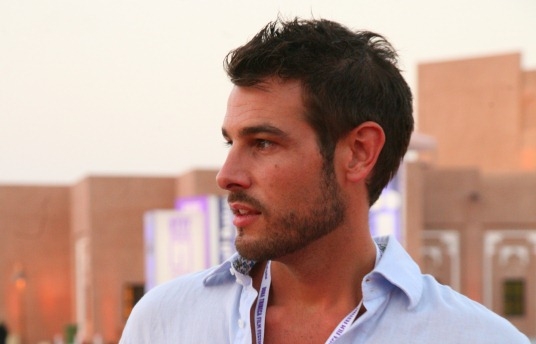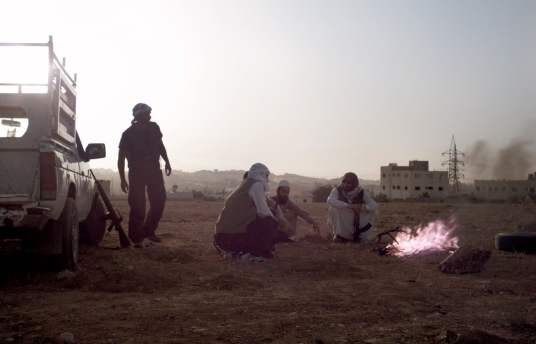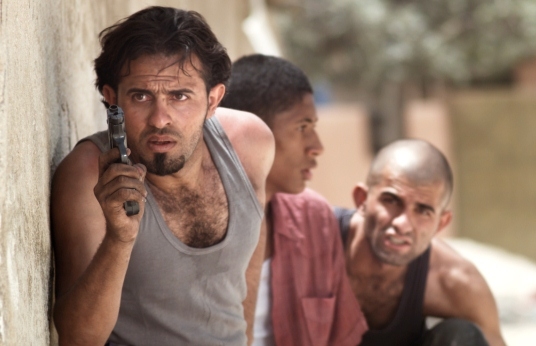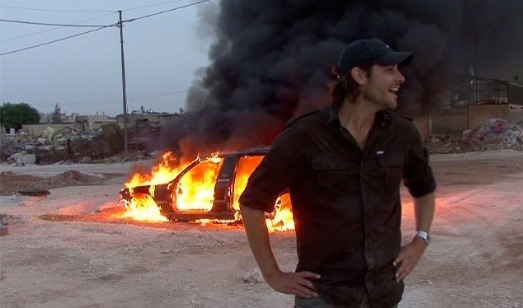People in Film: Regan Hall
Jun 28, 2011

Regan Hall graduated from film school in New Zealand and started his career as an editor in Wellington, home to Peter Jackson’s Weta Workshop. He moved to the UK in 2000 and soon after started his own production company, Progression Media, producing and directing films for the advertising, fashion, and music industries, where he has become known for his dynamic and collaborative fashion films for clients such as Dolce & Gabanna, Revlon, and Swarovski, most recently working on commercials with fashion photographer Mario Testino. Regan recently took a dramatic departure with his first major short film, the Iraqi war drama ‘3 Hours’, which aimed to create an emotive and engaging drama to show the human side of war. The award-winning film has drawn major industry support, including the team behind Oscar winner ‘The Hurt Locker’, and is now Oscar-qualifying for 2012.
DFI: When did you first become involved in the film industry?
Regan: When I was at school at the age of 15 I decided I wanted to be a director, so began by doing some free work experience in an advertising agency, and during my school holidays for television companies as a production assistant or runner. At the same time I was studying Media Studies at secondary school, where I filmed many of the school productions. I then went on to film school where I did a three year degree in television production. After graduation I began working as an editor, and two years later took the decision to move to London and further my career. I worked as an editor for three more years until I had saved enough money and gained enough experience to begin my production company and go freelance as a director.
DFI: You established Progression Media in 1994 – what inspired you to create this company, and can you tell us a little more about it?
Regan: The primary reason for starting my company was actually a tax decision – as a freelancer I was advised that it was a good idea to set myself up as a limited company. As my work progressed and my jobs became bigger, the company has grown with it. Now that my own directing work is specialised in fashion and drama, my team at Progression Media continues to create work in other areas as well.
DFI: What is the aim of Progression Media, and how do you achieve your goals?
Regan: As a director I am focused on a future as a feature filmmaker. My company gives me the income and steady base to support this. At the same time, I enjoy creating films for exciting and interesting clients – it helps me to build my skills and keeps me innovating. London is a hub for media, fashion, music, and advertising – most of our work comes from London. Generally work comes through personal recommendation, or through work that other companies have seen. We have worked with some very high profile companies and people. I think that once you become established in a niche it’s an exponential process – one job leads to another, which leads to another, and if the work is good it grows without you having to think about it.
DFI: You have several divisions within Progression Media, such as branding, fashion, music and commercials. Can you tell us a little more about them, and what their role is within the industry?
Regan: Two areas of work that have shown a lot of growth over the last few years is branded content and fashion films. Branded content is basically where a company sponsors film or video content, usually on the web. It usually involves social networks and YouTube, encouraging people to watch the video and interact with the brand. It means that brands are able to target their marketing at a particular audience (which is more cost-effective than general TV advertising), or take risks that they wouldn’t be able to take with a general, mass-market advertising campaign. Meanwhile, fashion films are showing up everywhere now – especially on websites and in stores. Film is a great medium for labels to show off their latest collection or define their brand.
DFI: You have worked with numerous big names across several industries, such as Dolce & Gabbana, FHM and Swarovski, amongst others, as well as working with models and actresses such as Sienna Miller and Emma Watson. Is there a particular style of client you look for, and what can your clients expect from you?
Regan: I wouldn’t say there was a particular style of client we look for, other than we enjoy working with the best. As we are a relatively small company, our focus is on the work – good work for a good client easily leads to great work for great clients. No matter what field you work in, understanding the needs of your client and knowing how to deliver is crucial. Yes, we work with many famous people; musicians, actors, models – they need to be handled well and with experience.
DFI: Can you run us through what a typical day is like for you?
Regan: A typical day? Wow, it’s hard to pin that one down as I don’t live a typical nine-to-five working week! In general, I spend half of my time in the office in London, and the rest of the time either shooting or traveling. Email is a crucial tool, especially communicating with clients overseas, so that takes up a good chunk of my morning. Usually we are busy editing a film we have just shot, and in pre-production for the next one. I film a lot overseas, so this involves flying to pre-production meetings or location scouts. Plus this year I have been going to a lot of international film festivals with my short film ‘3 Hours’. As anyone with their own business can relate to, I am never off-duty – my phone is always on.
DFI: What inspired you to make the short film ‘3 Hours’, and can you tell us about the story behind the film?
Regan: ‘3 Hours’ was made as a stepping stone towards feature film. I read an article in The Times newspaper in 2007 about the shooting of nine children in Baghdad by random gunmen. This caused the mixed Sunni and Shia neighbourhood to blame each other and go to war, while the real gunmen escaped unharmed. It was a tragic story that affected me deeply, and I immediately knew it would make a strong short film.

Members of the ‘3 Hours’ cast get into character for a scene.
DFI: You financed ‘3 Hours’ yourself – what made you decide to invest in this project?
Regan: We began by writing the script and applying for funding in the UK and New Zealand, my two home countries. Sadly due to the non-local subject matter we didn’t qualify for either, but I decided to go ahead anyway and self-finance. I put in half of the budget myself and found the other half elsewhere. Short films, even if very successful, don’t often make any money, so we knew we probably wouldn’t make our money back, let alone see a profit. But it is important for anyone, no matter what career you are in, to self-invest. We were setting out to make a high-quality film that would be a stepping stone in our careers – and that decision has been wholly justified. Now we have won awards, made some incredible industry contacts, and have a great piece of quality work to show for it.
DFI: Going from fashion and music films to a short film shot completely on location, in Arabic no less, must have been completely different. How did that affect you as a director?
Regan: It was quite a contrast to be filming terrorists in the heat and dust of the Middle East as opposed to the usual ease of shooting an attractive woman in a comfortable studio. But this is what I strive for – I am passionate about drama and it is where my heart and ambition will always lie. I was working with a very small budget, so had to use all of my skills as a producer and director to pull it off – luckily I had an amazing cast and crew working with me.
DFI: Where did you shoot ‘3 Hours’, and did you experience any challenges that you wouldn’t normally face, such as casting in a foreign country?
Regan: We filmed in Jordan, which often doubles for Iraq in films, and the Royal Jordanian Film Commission opened their doors to us – we couldn’t have done it without them. I managed to find some great local crew, including students of RSICA and SAE. My cast were all Iraqi refugees waiting in Jordan for placement around the world by the UNHCR. As non-actors, they did an incredible job. Making the film was such a rollercoaster journey (independent film making always is!), but a couple of funny stories stand out…
The Sean Penn movie ‘Fair Game’ was shooting at the same time as we were, as was the French Canadian film ‘Incendies’. Jordan’s film industry isn’t huge, so when there are a few productions on at once resources can get stretched. I had arranged to rent some amazing replica AK-47s for the week of our shoot, but the day before filming started we were told we had lost them to the Sean Penn movie. Making a film about a gun battle without guns is impossible. Luckily I’d just been to the market, where I saw two cigarette lighters in the shape of replica handguns. We ran and bought them, and for the duration of our shoot our actors were running around using the same two cigarette lighters! Luckily we managed to borrow the AK-47s for one afternoon to shoot our crucial terrorist scene, and no-one was any the wiser.
The other story involved Rafat, the nine year-old boy who played Tariq in my film. In the middle of our shoot he was offered a day of work on ‘Incendies’, so I rearranged our schedule so he could work on it. All was fine until he turned up on set the day afterwards – with his head shaved! I was about to shoot his crucial close-up scenes and was devastated. A few frantic phone calls later and we were able to construct a relatively convincing wig, so we managed to get away with it. Such is life on an independent film!

Cast members of ‘3 Hours’ during a shoot.
DFI: Since its worldwide premier at Doha Tribeca Film Festival in 2010, ‘3 Hours’ has won numerous awards worldwide and has been gathering critical acclaim. Can you tell us about this, and what you think is next for ‘3 Hours’?
Regan: Since premiering at the Doha Tribeca Film Festival ‘3 Hours’ has gone on to be selected by some of the best film festivals around the world. We have won some prestigious awards and now qualify for the Academy Awards next year. Our premiere in Doha was a wonderful experience – we loved the city, enjoyed the film programme, and the team at the DFI were simply fantastic. My aim is to shoot a feature in the region one day, so the hope is to one day return to the festival with a feature.
DFI: Is this type of project something that you hope to continue doing? What projects attract you, and what do you see yourself doing next?
Regan: I have a number of feature film projects I would like to shoot in the Middle East and Eastern Europe. With ‘3 Hours’ I was able to demonstrate my ability to shoot both drama and action, as well as direct in a second language and shoot in a foreign country. It is proving to be a great calling card.
DFI: Is there another sector of the industry that you would like to branch out to?
Regan: Post-production is an important part of the filmmaking process, and having that infrastructure at Progression Media has been useful to me as a filmmaker. We are about to handle the post production on a D&G commercial I am shooting with top fashion photographer Mariano Vivanco. I look forward to the day when I will have one edit suite busy with commercials, and the other busy with my films. If all goes well, hopefully that day isn’t too far off.
DFI: What does filmmaking mean to you?
Regan: Filmmaking to me means teamwork, passion, creativity, and drive. It takes all of these things to bring a story to the big screen. If you go to the cinema you just need to sit there and watch the credits roll to see all of the hundreds (sometimes thousands) of people involved in making a film. I’m sure if you asked any single one of them they would tell you they feel blessed to call their hobby their job – it’s a passion for us all.

Regan Hall on the set of ‘3 Hours’.
DFI: How do you think filmmaking has developed since you started in the business? What have these developments meant to you, and to the role you play?
Regan: Filmmaking has developed hugely over the past twenty years, most notably the technology. Desktop editing, high quality digital cameras, computer special effects – they are all incredibly recent and have made it so much easier for a new generation of filmmakers to make films. When I was a film student I was shooting on VHS video tape – now students can film in high definition and make work that is on a par with the best in the business. I am lucky to have been at the forefront of this digital revolution; part of the ‘new breed’, as it were.
DFI: Can you tell us your thoughts on the future of filmmaking in the Arab world, and what you believe might be coming next?
Regan: It has been wonderful to see filmmaking in the Arab world growing at such a pace. We live in a globally-connected world where cultural barriers are breaking down and audiences are becoming increasingly internationally aware – this means a growing hunger for Arabic films on the international market. Seeing the growing infrastructure in Doha, and the incredible support for the young generation through initiatives such as DFI, the opportunities for filmmakers in the region are immense.
DFI: What is the message you’d like to give to prospective young filmmakers out there, or to anyone who would like to follow in your footsteps?
Regan: My advice to young filmmakers is to keep at it – it is all about hard work and dedication. Practice makes perfect, so get shooting!
DFI: If you had to pick one film, from any genre or era, what would you say your favourite film is, and why?
Regan: A favourite film? It’s such a hard question to ask a director, plus I go to the cinema at least twice a week so have seen thousands! Today I will pick Anthony Minghella’s ‘The English Patient’. I aspire to make films in a similar vein – epic romance, exotic locations, with a sprinkling of war and tragedy. Minghella was a great director and the world lost him too soon.
Visit Regan’s websites to learn more about him: www.reganhall.com, Progression Media and ‘3 Hours’.
‘3 Hours’ – Trailer.